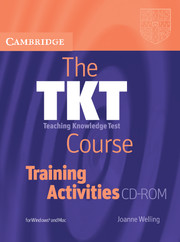2.4 - Parallel procedures
Published online by Cambridge University Press: 09 February 2024
Summary
Instructions
1. Divide the class into groups of four. Hand out one card to each trainee so that each group has all four cards between them.
2. Explain that the aim of the exercise is to brainstorm ideas for a lesson. Ask trainees what the main aim of the lesson is (to practise talking about the past). Explain that each trainee in each group has a different subsidiary aim relating to the same lesson. Ask the trainees to think of a possible procedure for this subsidiary aim and write it in the space next to possible procedure A.
3. Allow about two minutes and monitor, ready to help trainees who lack ideas. When all the trainees have written something down, ask them to fold down the top part of the paper so that their idea is hidden, but that possible procedure B is still visible. They should then pass the paper to the trainee on their left (within their group).
4. Have the trainees write in a possible procedure B for the aim on the paper they are now holding and continue the process until each paper has been passed around the whole group.
5. Explain that each group should now work together to use the ideas generated to create a lesson plan based around the ideas on the paper. They should choose one possible procedure for each subsidiary aim to create one lesson.
6. When they have finished, have each group present their lesson plans, with trainer's guidance.
Variation
Try the activity again with different main and subsidiary aims. Here are some suggestions:
Reading lesson
Main aim: to encourage use of class library for extensive reading
Subsidiary aims:
1 to raise interest in the topic
2 to introduce vocabulary for different book genres
3 to familiarise students with various books available
4 to give students practice in extensive reading in L2
Writing lesson
Main aim: to practise creative writing for pleasure Subsidiary aims:
1 to brainstorm ideas
2 to use recently taught adverbs in written work
3 to self-edit a variety of language mistakes
4 to motivate through content feedback
- Type
- Chapter
- Information
- The TKT Course Training Activities , pp. 57 - 58Publisher: Cambridge University PressFirst published in: 2024

